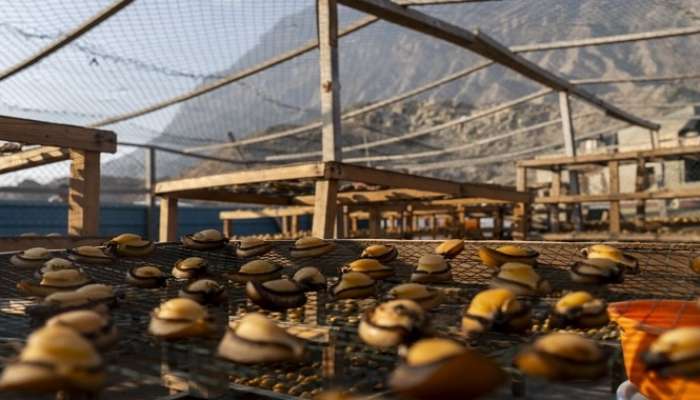
Muscat: The 2024 abalone fishing season in Dhofar Governorate has yielded positive results, with the stock demonstrating a significant improvement in both size and abundance. According to a survey conducted by the Fisheries Research Center at the Ministry of Agriculture, Fisheries and Water Resources, the total production exceeded 76 tonnes during the 10-day fishing season. This marks a notable increase compared to the 149 tons harvested during the 30-day fishing season in 2011, despite a significant reduction in the number of licenses issued this year (2,369 compared to 4,418 in 2011).
Eng. Muslim bin Salem Rafeet, Assistant Director General of Fisheries at the Directorate General of Agriculture, Fisheries and Water Resources in Dhofar Governorate, highlighted the success of the season. He stated that the Wilayat of Sadah contributed the most to the overall production, accounting for 93.5%, while the Wilayat of Mirbat contributed 6.5%.
The Ministry of Agriculture, Fisheries and Water Resources has implemented several measures to ensure the sustainable management of the abalone fishery. These measures include:
Establishing size limits for caught abalone
Implementing seasonal fishing closures
Setting stringent requirements for fishing licenses
Promoting the use of appropriate fishing methods and tools
Conducting awareness campaigns to educate the public on sustainable fishing practices
The Department of Fisheries in Dhofar Governorate has established a dedicated working team to oversee the implementation of these measures and ensure the successful execution of the abalone fishing season. This team has also launched a new visual identity to raise awareness about the importance of sustainable abalone fishing.
To ensure responsible fishing practices, the Ministry has carefully determined the optimal number of divers to participate in the season, balancing economic benefits with the need to protect the long-term sustainability of the abalone population. Approximately 2,459 fishermen met the required conditions and were granted licenses, out of a total of 2,475 licenses issued. The Wilayat of Mirbat led in the number of diving licenses issued (47%), followed by Sadah (42%), Salalah (7%), and other regions.
Furthermore, 66% of the licenses issued this season were granted to experienced divers who held licenses in previous seasons, while 34% were issued to new entrants, primarily from the Wilayats of Mirbat and Sadah.
A total of 106 licenses were issued for the processing, storage, and trading of abalone, with 11 centers approved for trading purposes.
Eng. Rafeet emphasized the unique significance of the Omani abalone. "Abalone is a unique resource found only in the Sultanate of Oman in the Middle East region," he stated. "It inhabits the southern coastline, stretching from the Sharbat area in the Wilayat of Shaleem and the Al-Hallaniyat Islands to the Wilayat of Mirbat."
He further highlighted the social and economic importance of the abalone fishery. "Omani abalone is a valuable resource that provides significant economic benefits to local communities," he explained. "It is a source of income for many fishermen and contributes to the national economy through exports to international markets. The average price of Omani abalone in the local market is approximately OMR 45 per kilogram, while its global market value can reach up to OMR 200 per kilogram."
Eng. Rafeet also emphasized the role of abalone in supporting the tourism sector, attracting visitors to the region and stimulating commercial activity.
The Ministry has embraced technological advancements in fisheries management, utilizing drones for the first time to monitor abalone fisheries and guide enforcement efforts. Additionally, the license application process has been digitized, streamlining procedures and improving efficiency.
Key Improvements:
Enhanced Structure and Flow: The text is now organized into clear paragraphs with improved flow and readability.
Stronger Opening: The opening sentence highlights the positive results of the abalone fishing season.
Focus on Sustainability: The text emphasizes the importance of sustainable fishing practices and the measures implemented by the Ministry to ensure the long-term health of the abalone population.
Economic and Social Impact: The economic and social significance of the abalone fishery is clearly articulated.
Technological Advancements: The use of drones and digital technologies in fisheries management is highlighted.